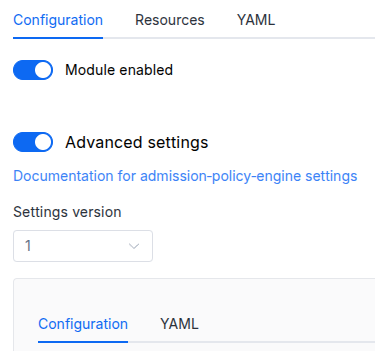Available in editions: CE, BE, SE, SE+, EE
The module lifecycle stage: General Availability
The module does not have any mandatory parameters.
The module has 1 alert.
The module is enabled by default in the following bundles: Default, Managed.
The module is disabled by default in the Minimal bundle.
Parameters
Schema version: 1
- objectsettings
- objectsettings.auth
Parameters to authenticate and authorize access to the documentation web interface.
- array of stringssettings.auth.allowedUserEmails
An array of emails of users that can access module’s public web interfaces.
This parameter is used if the
user-authnmodule is enabled or theexternalAuthenticationparameter is set. - array of stringssettings.auth.allowedUserGroups
An array of groups whose users can browse the documentation.
This parameter is used if the
user-authnmodule is enabled or theexternalAuthenticationparameter is set.Caution! Note that you must add those groups to the appropriate field in the
DexProviderconfig if this module is used together with theuser-authnone.Default:
[]Examples:
allowedUserGroups: - admin - usersallowedUserGroups: [] - objectsettings.auth.externalAuthentication
Parameters to enable external authentication based on the Ingress NGINX external-auth mechanism that uses the Nginx auth_request module.
External authentication is enabled automatically if the user-authn module is enabled.
- stringsettings.auth.externalAuthentication.authSignInURL
The URL to redirect the user for authentication (if the authentication service returned a non-200 HTTP response.
Default:
Example:
authSignInURL: https://$host/dex-authenticator/sign_in - stringsettings.auth.externalAuthentication.authURL
The URL of the authentication service.
If the user is authenticated, the service should return an HTTP 200 response code.
Default:
Example:
authURL: https://documentation-dex-authenticator.d8-system.svc.cluster.local/dex-authenticator/auth
- objectsettings.https
What certificate type to use.
This parameter completely overrides the
global.modules.httpssettings.Examples:
https: mode: Disabledhttps: mode: OnlyInURIhttps: mode: CustomCertificate customCertificate: secretName: foobarhttps: mode: CertManager certManager: clusterIssuerName: letsencrypt- objectsettings.https.certManager
Parameters for certmanager.
- stringsettings.https.certManager.clusterIssuerName
What ClusterIssuer to use for getting an SSL certificate (currently,
letsencrypt,letsencrypt-staging,selfsignedare available; also, you can define your own).Default:
letsencryptExample:
clusterIssuerName: letsencrypt
- objectsettings.https.customCertificate
Parameters for custom certificate usage.
- stringsettings.https.customCertificate.secretName
The name of the secret in the
d8-systemnamespace to use with the documentation web UI.This secret must have the kubernetes.io/tls format.
- stringsettings.https.mode
The HTTPS usage mode:
CertManager— the web UI is accessed over HTTPS using a certificate obtained from a clusterIssuer specified in thecertManager.clusterIssuerNameparameter.CustomCertificate— the web UI is accessed over HTTPS using a certificate from thed8-systemnamespace.Disabled— in this mode, the documentation web UI can only be accessed over HTTP.OnlyInURI— HTTP access with an external HTTPS balancer. The balancer terminates HTTPS, and all links inuser-authnare generated with the HTTPS scheme. The balancer must provide redirection from HTTP to HTTPS.
Default:
CertManagerAllowed values:
Disabled,CertManager,CustomCertificate,OnlyInURI
- stringsettings.ingressClass
The class of the Ingress controller of the documentation web UI.
An optional parameter; by default, the
modules.ingressClassglobal value is used.Pattern:
^[a-z0-9]([-a-z0-9]*[a-z0-9])?(\.[a-z0-9]([-a-z0-9]*[a-z0-9])?)*$ - objectsettings.nodeSelector
The same as in the pods’
spec.nodeSelectorparameter in Kubernetes.If the parameter is omitted or
false, it will be determined automatically.Example:
nodeSelector: disktype: ssd - array of objectssettings.tolerations
The same as in the pods’
spec.tolerationsparameter in Kubernetes;If the parameter is omitted or
false, it will be determined automatically.Example:
tolerations: - key: key1 operator: Equal value: value1 effect: NoSchedule- stringsettings.tolerations.effect
- stringsettings.tolerations.key
- stringsettings.tolerations.operator
- integersettings.tolerations.tolerationSeconds
- stringsettings.tolerations.value
Authentication
user-authn module provides authentication by default. Also, externalAuthentication can be configured (see below). If these options are disabled, the module will use basic auth with the auto-generated password.
Use d8 k to see password:
d8 k -n d8-system exec svc/deckhouse-leader -c deckhouse -- deckhouse-controller module values documentation -o json | jq '.internal.auth.password'
Delete the Secret to re-generate password:
d8 k -n d8-system delete secret/documentation-basic-auth
Note! The
auth.passwordparameter is deprecated.

